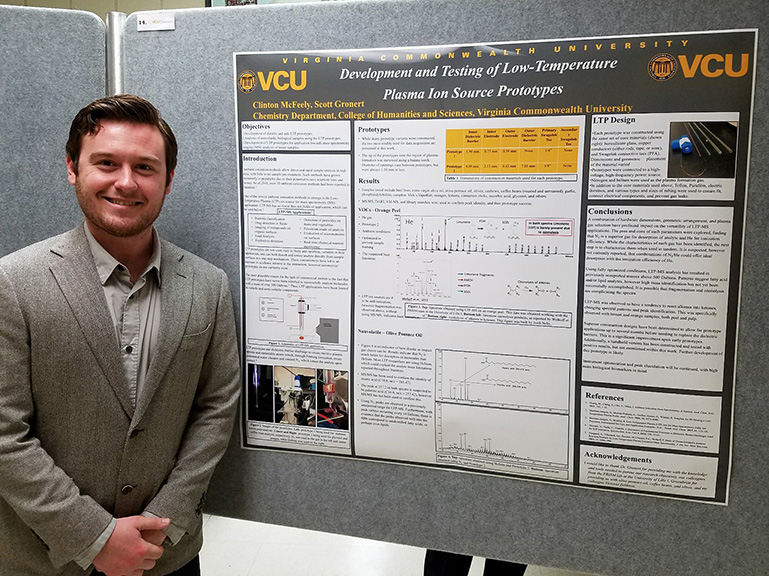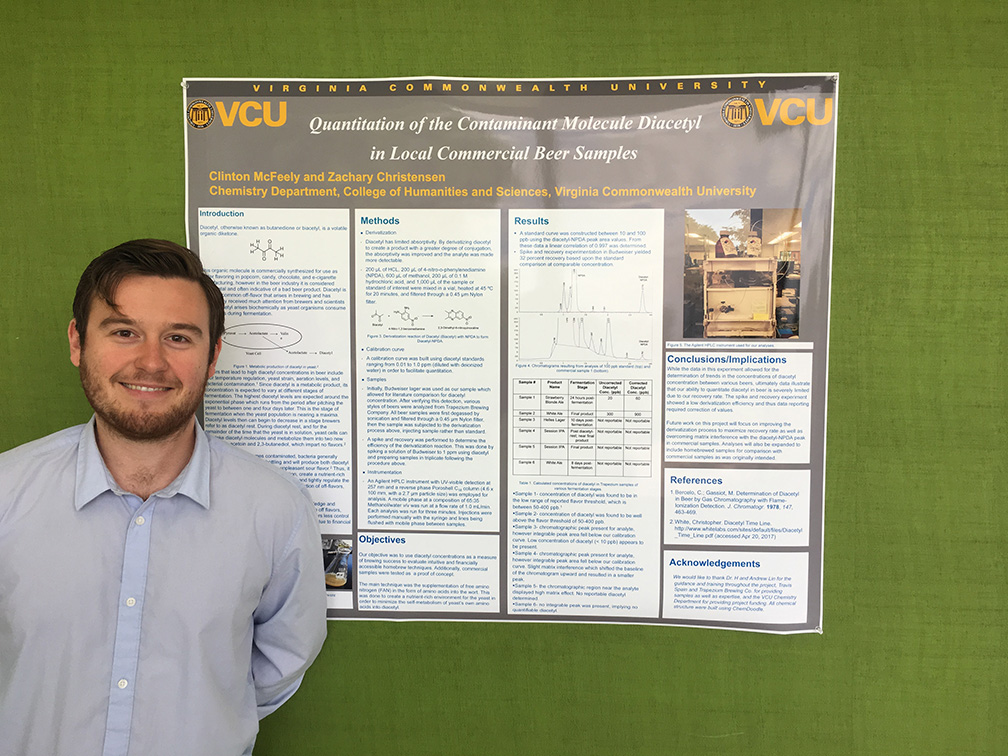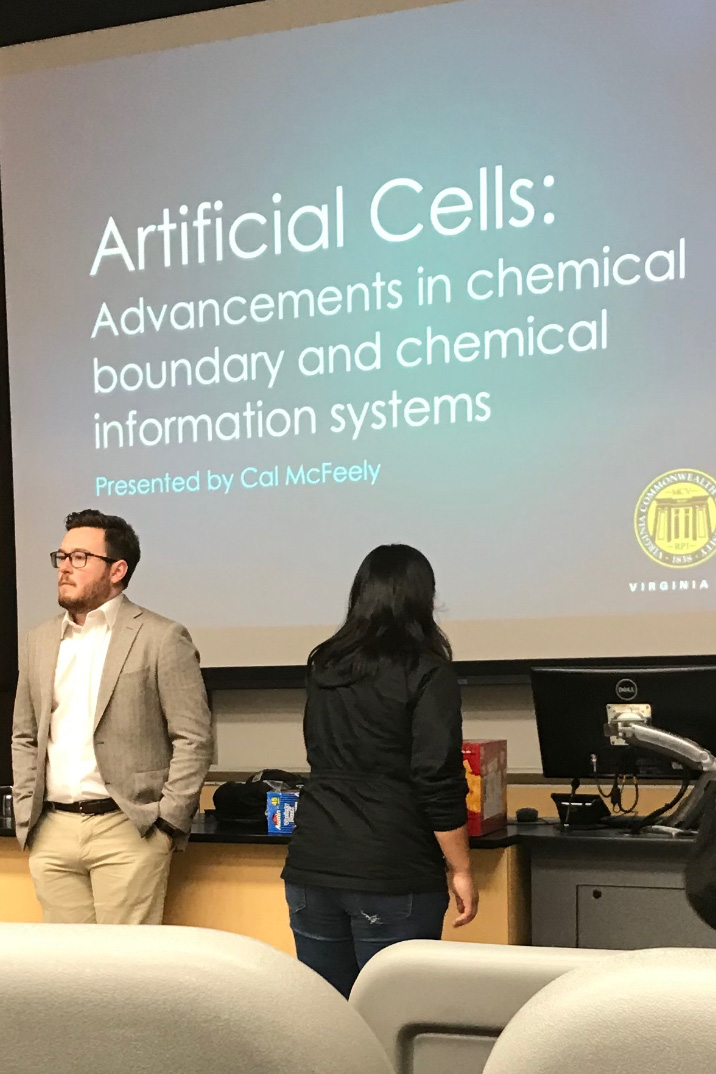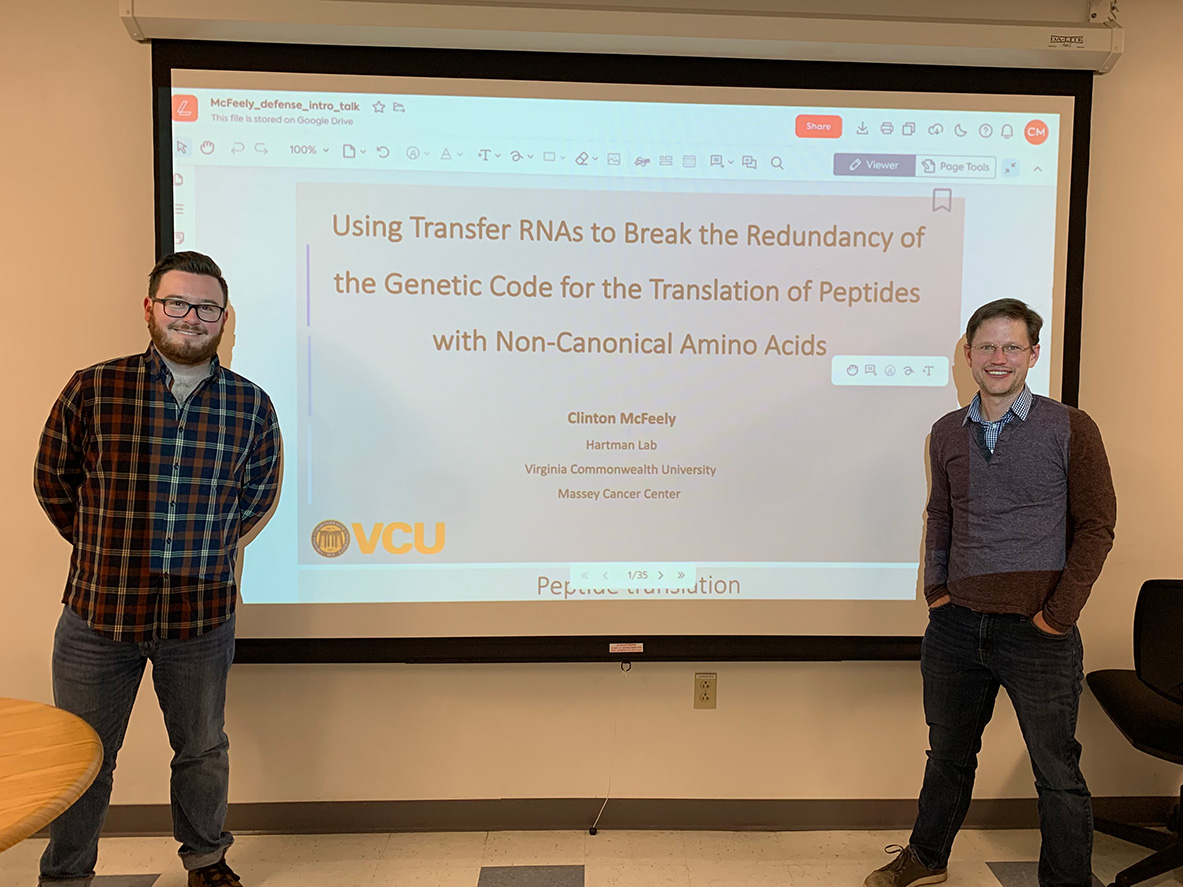Clinton McFeely, Ph.D. (B.S. ’14, B.S. ’17, Ph.D. ’22) experiments at the molecular level in search of new treatments
Oct. 22, 2025

Clinton McFeely, Ph.D., (B.S. ’14, B.S. ’17, Ph.D. ’22) is a senior advisor at Eli Lilly and Company, working in early drug discovery research at their labs in San Diego, Calif. An infinitely curious person excited by puzzle-solving, he works to turn theory into potential medicine.
McFeely, who grew up in the greater Richmond area, transferred to VCU to pursue engineering, but he quickly found his niche in theoretical science. What followed was eight years of scientific pursuits in the Departments of Physics and Chemistry where he developed the skills necessary to not only conduct research but also be a teacher for other scientists.
What drew you to VCU to pursue studies in physics and chemistry?
 I transferred from Radford University where I first found my passion for science through a few physics and geology courses. I decided I wanted to pursue electrical engineering, which was not a supported program at Radford, so I transferred to VCU over Virginia Tech because I had a community in RVA. As I continued to dive deeper into science and math courses, I realized my interest was more in theoretical science and less in practical applications, so I ended my pursuit of electrical engineering and took up physics as a major.
I transferred from Radford University where I first found my passion for science through a few physics and geology courses. I decided I wanted to pursue electrical engineering, which was not a supported program at Radford, so I transferred to VCU over Virginia Tech because I had a community in RVA. As I continued to dive deeper into science and math courses, I realized my interest was more in theoretical science and less in practical applications, so I ended my pursuit of electrical engineering and took up physics as a major.
A few months after graduating from VCU, I felt that it would be in the best interest of my career to return to VCU and further my studies in chemistry. I had minored in it while studying physics and knew that a second bachelor’s degree would only take me three or four semesters. I specifically pursued my chemistry education at VCU due to its reputation as a research institute. I wanted to begin working in a research lab while pursuing my chemistry degree and knew VCU would help me reach this goal.
What was it about physics that excited you as a student? About chemistry?
I was definitely drawn to the abstract nature of physics. Modern physics stands out as one of my favorite courses. Recreating the Millikan Oil Drop experiment in a physics lab was mind-bending; Robert Millikan, Ph.D., won a Nobel prize for those insights and demonstrations, and I got to replicate that work in a lab. I also became quite good at math and it got to the point where solving physics equations felt like building a puzzle. I just had fun in these classes.
Same story with chemistry. I was exposed to big ideas and experiments performed by famous scientists who built the foundation of modern science. Chemistry in particular brought me more and more into the lab, which is a good thing because I've built a career for myself as a lab scientist.
 What is your favorite memory from attending VCU?
What is your favorite memory from attending VCU?
Graduation is an easy answer. That was obviously a major highlight not just for me but also for my family, as I'm the first college graduate in my family.
However, the single most impactful memory would be the fateful day that I decided to go ask my qualitative analysis professor a question. While waiting to talk to them, I met my now-girlfriend and partner of the past 10 years. I remember those moments vividly.
You first graduated with a degree in physics and a minor in chemistry before pursuing a bachelor’s and doctorate in chemistry. How did your experience in the physics department prepare you to tackle a second scientific discipline?
There's a decent amount of topic overlap between chemistry and physics, so I was definitely prepared for certain chemistry classes because I had already been exposed to certain concepts. Quantum mechanics, for example, is taught in both upper level physics and chemistry courses.
But as far as being equipped with tools, the math skills I developed as a physics major were pretty rare for a chemistry student. You won't find many undergraduate chemists who have taken multivariate calculus and differential equations. Being skilled in mathematical/quantitative reasoning was a major asset in my chemistry pursuits and continues to be a strength in my career.
What does your day-to-day look like in your current role with Eli Lilly and Company?
Currently, I'm a research scientist working in early drug discovery, meaning my job is to discover molecules that can be developed into medicine. I'm about three years into my industry career, and at this point I'm seen as a subject matter expert on the platform I work on so I'm finding myself in more meetings and giving more presentations. Day to day, I'm running my own experiments, advising and supporting the junior scientists who work on my team, and working cross-functionally with other parts of the organization to ensure that our our team gets the support we need to function at a high level, and that our efforts are aligned with the company's goals.
On a typical day, I spend up to an hour thinking carefully about my experimental design, then I run my experiment, collect and analyze my data, and attend a handful of meetings throughout the day. After work on Mondays, a few coworkers and I go surfing down at La Jolla Shores, and on Tuesdays I play in a work soccer league.
Reflecting on your time at VCU, how do you feel your time in the Department of Physics and the Department of Chemistry helped prepare you to accomplish the work you’ve done so far in your career?
 It’s the skills I developed through my education that continue to propel my career in an exciting direction. The classroom learnings are important, but the math and lab skills I developed are what truly enables my career. Being a T.A. in graduate school also made a big impact in my professional skillset, and I think I do a good job of communicating complex ideas and helping younger scientists develop their skillset and knowledge.
It’s the skills I developed through my education that continue to propel my career in an exciting direction. The classroom learnings are important, but the math and lab skills I developed are what truly enables my career. Being a T.A. in graduate school also made a big impact in my professional skillset, and I think I do a good job of communicating complex ideas and helping younger scientists develop their skillset and knowledge.
What’s your why?
I'm not sure I fully know yet. I mean, from an early age I became very aware of the fragility of human health when I was nine years old, as my little sister was diagnosed with leukemia as an infant. She received her treatment at Massey Comprehensive Cancer Center, which is where I worked during grad school. I can't say it was exactly the plan to end up there, but at the same time I think it's beautiful that I did.
Working in drug discovery now, it would certainly be the pinnacle of my career if a molecule I discovered makes it to the market as an FDA-approved medicine. That's what I'll keep working toward.